All fields are required
Posted in Our Blog,Outbreaks & Recalls,Salmonella on August 3, 2020
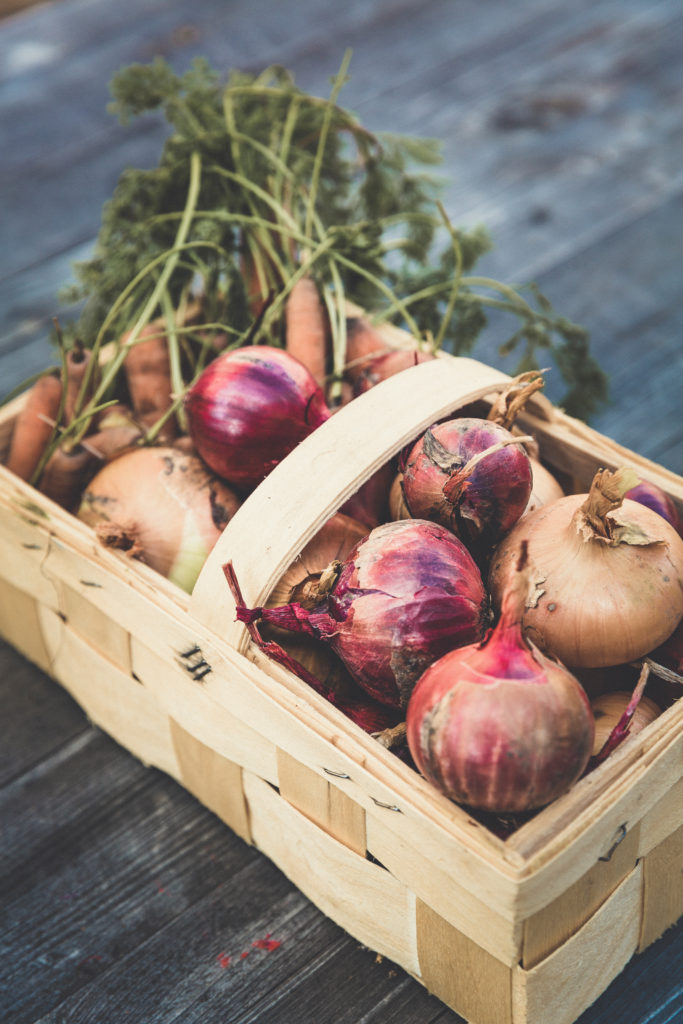
Last week, the CDC and FDA told US consumers that the mystery Salmonella outbreak finally had a confirmed source: onions. Now, those with onions at home are wondering “Which onions have been recalled?” Look no further. Here is the latest in the Thomson International Onion Recall.
On August 1, 2020, Thomson International Inc. of Bakersfield, California announced its recall of Red, Yellow, White, and Sweet Yellow Onions shipped from May 1, 2020 through the present. According to the notice, “[t]he onions are being recalled because they have the potential to be contaminated with Salmonella, an organism that can cause serious and sometimes fatal infections in young children, frail or elderly people, and others with weakened immune systems. Healthy persons infected with Salmonella often experience fever, diarrhea (which may be bloody), nausea, vomiting and abdominal pain. In rare circumstances, infection with Salmonella can result in the organism getting into the bloodstream and producing more severe illnesses such as arterial infections (i.e., infected aneurysms), endocarditis and arthritis.”
The affected Onions were distributed to wholesalers, restaurants, and retail stores in all 50 states, the District of Columbia and Canada.
The notice goes on to specify that the affected onions were “distributed in 5 lbs. carton. 10 lbs. carton. 25 lbs. carton. 40 lbs. carton, 50 lbs. carton. bulk, 2 lb. mesh sacks, and 3 lb. mesh sacks, 5 lb. mesh sacks, 10 lb. mesh sacks 25 lbs. mesh sacks, 50 lbs. mesh sacks under the brand names Thomson Premium, TLC Thomson International, Tender Loving Care, El Competitor, Hartley’s Best, Onions 52, Majestic, Imperial Fresh, Kroger, Utah Onions and Food Lion.”
Here are some of the labels and packaging photos:




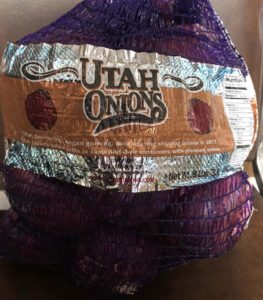
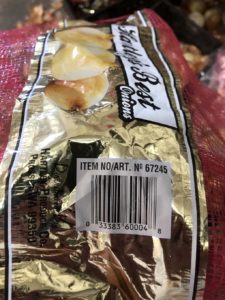
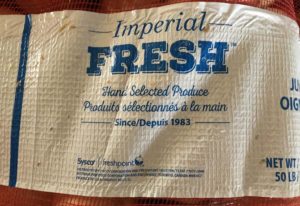


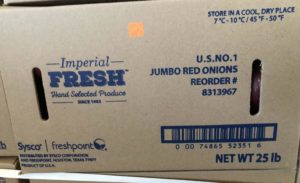
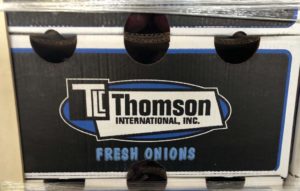
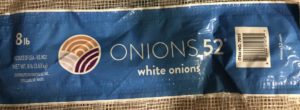

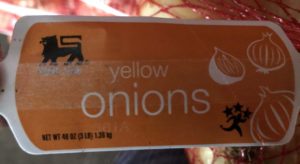
It is important to note that more brands and suppliers may be involved in this outbreak. As of now no specific source of contamination or contaminated shipment has been identified, and FDA is also investigating other potential sources of contamination and has not yet reached a final conclusion.
396 total illnesses have been reported to date including 59 hospitalizations. States with cases include: AK (6), AZ (14), CA (49), CO (10), FL (3), ID (5), IL (10), IN (2), IA (15), KS (1), KY (1), ME (4), MD (1), MI (23), MN (10), MO (6), MT (33), NE (5), NV (5), NY (4), NC (3), ND (5), OH (7), OR (71), PA (2), SC (1), SD (11), TN (5), TX (1), UT (61), VA (4), WA (2), WI (5), and WY (11).
The investigation is ongoing.
In Canada, at least 114 people have gotten Salmonella food poisoning. 16 people have been hospitalized in the red onions Salmonella outbreak. Here is the latest Canadian case count: British Columbia (43), Alberta (55), Manitoba (13), Ontario (2), and Prince Edward Island (1). The individual from Prince Edward Island reported traveling to Alberta before becoming ill. Saskatchewan has not reported any confirmed illnesses related to this outbreak, but provincial public health authorities are investigating some Salmonella Newport illnesses in the province.
The investigation is ongoing.
Salmonella Newport (Salmonella enterica serovar newport) is a serotype of Salmonella that is known to cause infection in humans. Known for its resistance to various drugs, Salmonella Newport is known to originate from animals – namely farm animals like cows, horses, goats, etc. In fact, in 2004, the American Association of Veterinary Laboratory Diagnosticians named Salmonella Newport as an “emerging disease.” The National Veterinary Services Laboratories also listed Salmonella Newport as “one of the top ten most frequently identified Salmonella serotypes from U.S. cattle from July 1998 through June 1999.”
The symptoms for Salmonella Newport are alike to those of other Salmonella serotypes, and include:
The FDA recommends that consumers who have any Red, Yellow, White, and Sweet Yellow Onions under the above brand names, or who cannot tell if their onions are from Thomson International, should immediately discard these products and disinfect any surfaces that came into contact with the onions.
In the meantime, “consumers, restaurants, and retailers should not eat, sell, or serve red, white, yellow, or sweet onions from Thomson International, Inc. or products containing such onions. If you cannot tell if your onion is from Thomson International Inc., or your food product contains such onions, you should not eat, sell, or serve it, and should throw it out.”
The Public Health Agency of Canada has advised, “Until more is known about the outbreak, individuals in British Columbia, Alberta, Saskatchewan, Manitoba, and Ontario are advised to not eat any red onions imported to Canada from the U.S., including any food products that contain raw red onions imported from U.S.. Retailers and restaurants in these locations are also advised not to use, sell or serve red onions imported from the U.S. Red onions grown in Canada are not affected by this advice.”
If you or someone you love is sick after eating onions, urgent medical attention is recommended. Make sure to ask for a stool test to ensure Salmonella is the cause of your illness.
Our mission is to help families who have been harmed by contaminated food or water. When corporations cause Salmonella food poisoning outbreaks, we use the law to hold them accountable. The Lange Law Firm is one of the only law firms in the nation focused on representing families in food poisoning lawsuits.
If you got sick in this latest Onion Salmonella Outbreak or from the Thomson International Onion Recall and are interested in making a legal claim for compensation, we can help. Our Salmonella lawyer can help you pursue compensation for your Salmonella food poisoning. Call us for a free no obligation legal consultation at (833) 330-3663 or send us an e-mail here.
By: Candess Zona-Mendola